Mostrar el registro sencillo del ítem
Estrategias de afrontamiento y nivel de sobrecarga en el cuidador informal de la persona con Alzheimer. Hospital Regional Docente de Trujillo 2013
| dc.contributor.advisor | Cueva Loyola, Flor Emperatriz | |
| dc.contributor.author | Chacón Rosado, Edward Cleymer | |
| dc.contributor.author | Valverde De La Cruz, Lucero Natalí | |
| dc.creator | Chacón Rosado, Edward Cleymer | |
| dc.date.accessioned | 2014-09-23T23:56:01Z | |
| dc.date.available | 2014-09-23T23:56:01Z | |
| dc.date.issued | 2014 | |
| dc.identifier.uri | https://hdl.handle.net/20.500.12759/307 | |
| dc.description.abstract | La presente investigación de tipo correlacional y de corte transversal, se realizó con la finalidad de determinar la relación entre las estrategias de afrontamiento y el nivel de sobrecarga del cuidador informal de la persona con Alzheimer. La población de estudio estuvo conformada por 40 cuidadores informales. Se aplicaron 2 instrumentos: uno para identificar las estrategias de afrontamiento y el segundo para identificar el nivel de sobrecarga del cuidador informal. Se encontró que las estrategias de afrontamiento más utilizadas son: Resolución de Problemas 87.5%, Pensamiento Desiderativo 87.5%, y Reestructuración Cognitiva 80%. En relación a la sobrecarga, se evidenció que el 40% presenta sobrecarga leve, 32,5% no sobrecarga y 27,5% sobrecarga intensa. Existe una relación significativa entre Estrategias de Afrontamiento y Nivel de Sobrecarga. | es_PE |
| dc.description.abstract | This research correlational and cross-sectional, was conducted in order to determine the relationship between coping strategies and level of overload informal caregiver of the person with Alzheimer's. The study population consisted of 40 informal caregivers. 2 instruments were applied: one to identify the coping strategies and the second to identify the level of informal caregiver overload. We found that the most used strategies are coping: Troubleshooting 87.5%, 87.5% Desiderative Thinking and Cognitive Restructuring 80%. Regarding overload, we found that 40% have mild overload, not overload 32.5% and 27.5% greater burden. There is a significant relationship between Coping Strategies and Overload level | en_US |
| dc.description.uri | Tesis | es_PE |
| dc.format | application/pdf | es_PE |
| dc.language.iso | spa | es_PE |
| dc.publisher | Universidad Privada Antenor Orrego | es_PE |
| dc.rights | info:eu-repo/semantics/openAccess | es_PE |
| dc.rights.uri | https://creativecommons.org/licenses/by/4.0/ | es_PE |
| dc.source | Universidad Privada Antenor Orrego | es_PE |
| dc.source | Repositorio Institucional - UPAO | es_PE |
| dc.subject | Atención al enfermo | es_PE |
| dc.subject | Alzheimer | es_PE |
| dc.title | Estrategias de afrontamiento y nivel de sobrecarga en el cuidador informal de la persona con Alzheimer. Hospital Regional Docente de Trujillo 2013 | es_PE |
| dc.type | info:eu-repo/semantics/bachelorThesis | es_PE |
| thesis.degree.level | Título Profesional | es_PE |
| thesis.degree.grantor | Universidad Privada Antenor Orrego. Facultad de Ciencias de la Salud | es_PE |
| thesis.degree.name | Licenciada en Enfermería | es_PE |
| thesis.degree.discipline | Enfermería | es_PE |
| renati.type | https://purl.org/pe-repo/renati/type#tesis | es_PE |
| renati.level | https://purl.org/pe-repo/renati/level#tituloProfesional | es_PE |
| dc.publisher.country | PE | es_PE |
Ficheros en el ítem
Este ítem aparece en la(s) siguiente(s) colección(es)
-
Enfermería [273]


